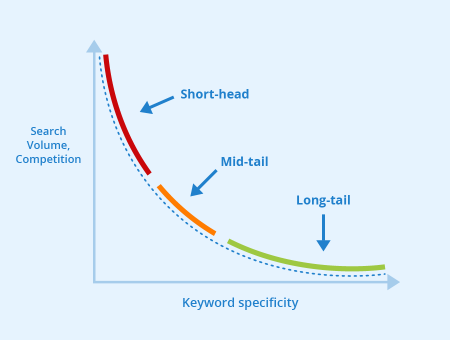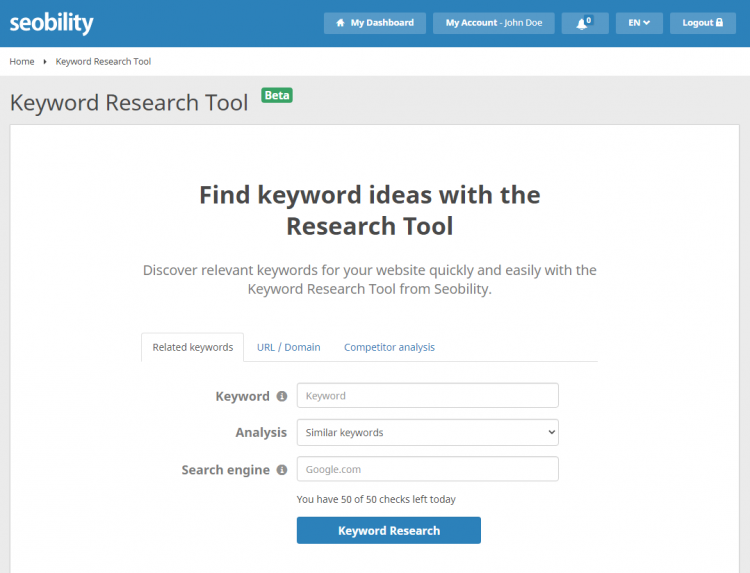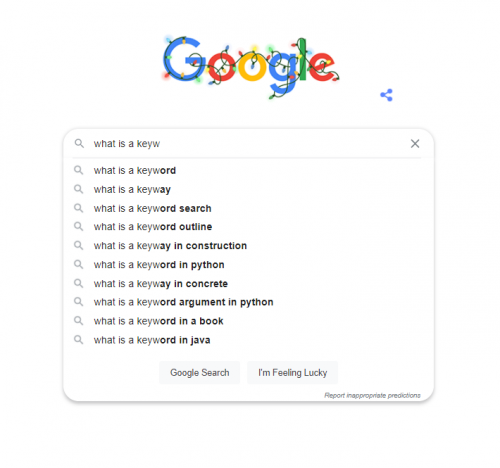Difference between revisions of "Keyword"
(→Related links) |
|||
| Line 73: | Line 73: | ||
== Related links == | == Related links == | ||
| − | * https:// | + | * <html><a href="https://www.seobility.net/en/blog/how-to-do-keyword-research/" target="_blank">Keyword Research And Analysis: How To Find The Best Keywords For Your Website - Seobility Blog</a></html> |
| − | * https:// | + | * <html><a href="https://keyword.com/guides/" target="_blank">https://keyword.com/guides/</a></html> |
== Similar articles == | == Similar articles == | ||
Revision as of 14:30, 30 August 2023
Contents
Definition
In general, keywords are used to describe the content of a work of art or a document in different areas such as art and culture, media, or industry. Today, the term keyword is primarily used in digital marketing and SEO to describe a word or group of words that internet users use when performing a search with a search engine such as Google.
Types of keywords
In SEO, keywords are classified as money, brand, compound, or other keywords, based on their content.
Money keywords
A money keyword is a keyword with high search volume and high competition in terms of ranking in Google search. For commercial websites, "money" means that these keywords are associated with a purchase intention. Examples of money keywords are "buy mountain bike" or "web design offers". For other, non-commercial websites, "money" describes the informative nature of the website content. For example, "mountain bike repair instructions" or "castles in Scotland".
Brand keywords
A brand keyword contains the brand name of a company or variations of it. Examples are “Nike", "Apple" or "IBM". In most cases, keywords of this kind are used for informational searches when users want to find out more about products or a company.
Compound keywords
A compound keyword is a combination of a money keyword and a brand keyword. The search intent is usually the purchase of a specific product. Examples of combined keywords are "buy Adidas basketball shoes" or "Honda CBR650R cheap".
Other keywords
All keywords that cannot be assigned to one of the above categories are so-called "other" keywords. Examples are "information" or "click here".
In SEO, keywords can also be categorized into short-tail and long-tail keywords.
Short-tail keywords

A short-tail or short-head keyword consists of three or fewer words. A short-tail keyword has a high search volume and high competition. Search engine users use these keywords when they search for information or products in the first step. For this reason, it is very difficult to determine the exact search intent for short-tail keywords. Conversion rates for these keywords generally are very low.
Long-tail keywords
A long-tail keyword consists of three or more words. With long-tail keywords, users can get more specific search results. For example, a search in Google with the short-tail keyword "headphones" will produce approximately 26 million results. Searching with a specific long-tail keyword such as "Beats Studio 3 Bluetooth Black Headphones" reduces the number of search results to a fraction. Long-tail keywords usually have a low search volume and low competition. Long-tail keywords also play an increasingly important role in SEO for voice searches with mobile devices, such as "Where can I find the best Italian restaurant in New York?”.
Importance of keywords for on-page SEO
Using relevant keywords on your website is an essential part of on-page SEO. Keywords tell search engines which topic your website is about. This information is used for indexing and ranking the website in search results. You should use your main keyword in the title of your website, in the meta-description, in the first heading [H1], in the content, and in ALT attributes of images. More important than a high number of keywords, however, is the value that your content offers to visitors, as well as a good structure and legibility of your content.
Keyword SEO Checker
Check if your site is optimized for your most important keywords
Importance of keywords for off-page optimization
There can be positive effects on your website's ranking if relevant keywords are used in anchor texts of backlinks (links from other websites that refer to your website). Google and other search engines analyze these anchor texts and use them to assess the relevance of the linked page. However, the excessive use of keywords, and in particular money keywords, is considered spam and can be punished by Google.
Keyword tools
There are several free and paid tools that SEOs can use for keyword research, such as the free Seobility Keyword Research Tool. This tool allows you to search for similar keywords based on a focus keyword, and to find the most important traffic sources of your competitors, using the competitor analysis feature. Thanks to several sorting and filter options, you can then create your individual keyword set.

Screenshot of Seobility's Keyword Research Tool on seobility.net
Google itself provides tools for keyword research as well, including Google Suggest (Google Autocomplete) and the Google Ads Keyword Planner tool. Google Suggest is an extension of the search engine. When a keyword is entered into Google search, Google displays a list of suggestions frequently entered by users. The Keyword Planner tool in Google Ads provides information about the search volume, competition, and expected traffic of keywords, helping advertisers plan their Google Ads campaigns.

Screenshot showing Google Suggest of google.com
Other tools such as AnswerThePublic and Hypersuggest help to search for questions frequently entered by users in Google Search.
Related links
- Keyword Research And Analysis: How To Find The Best Keywords For Your Website - Seobility Blog
- https://keyword.com/guides/